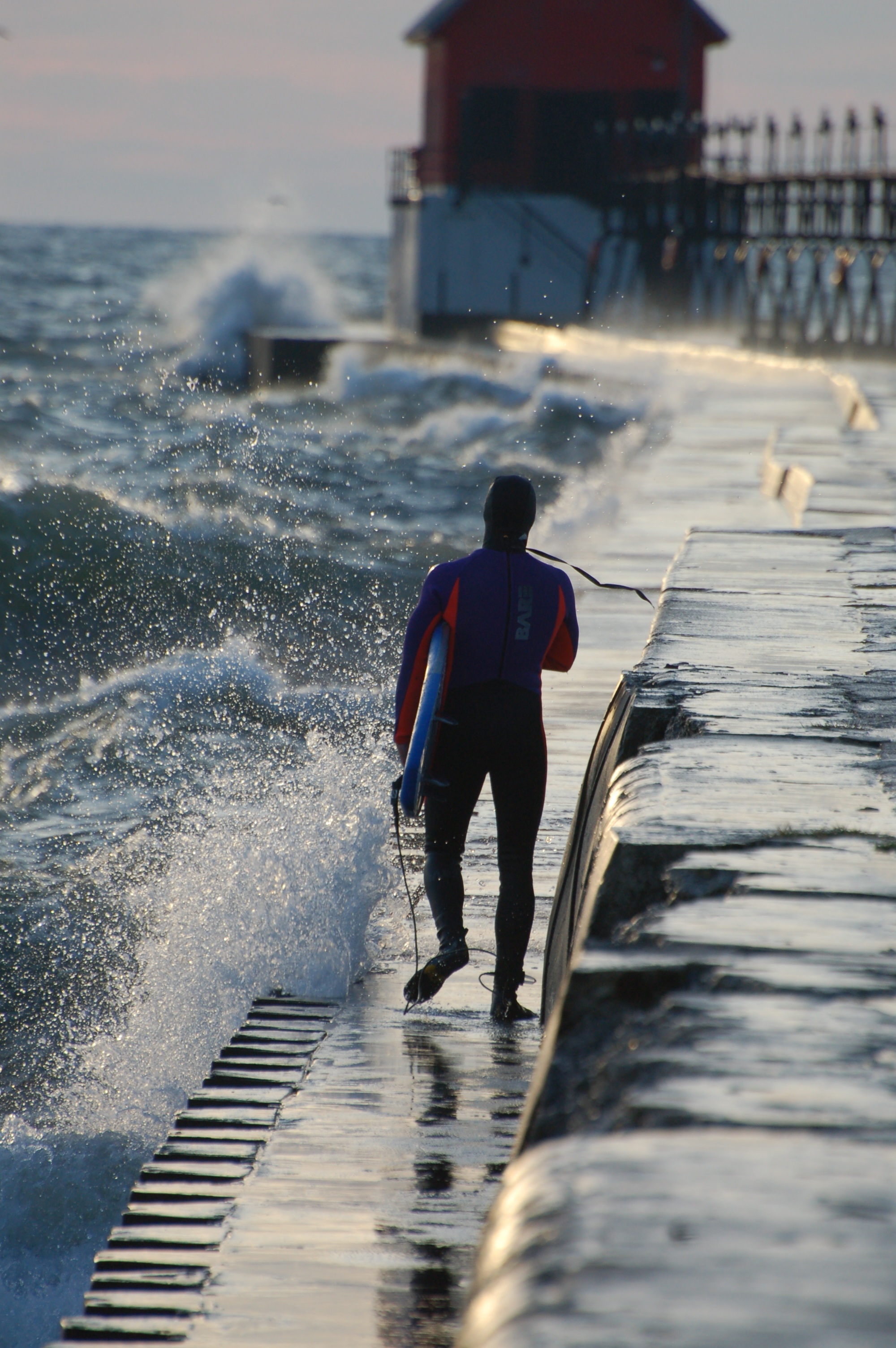
As a father and as a resident of Grand Haven, Mich., Vince Deur said it’s natural for him to care about the future of the Great Lakes.
But that’s not what brought him in front of Congress last year to talk about water quality.
Deur is a surfer and founder of the Lake Michigan Chapter of the Surfrider Foundation, a nonprofit group linking surfers to environmental causes.
The organization has 90 chapters and 50,000 members worldwide. Deur’s chapter represents those who surf miles from any ocean.
Last February, Deur was asked by the Healing Our Waters Coalition, a group working to restore the Great Lakes, to lobby in Washington, D.C. on Great Lakes Day. He was the only surfer among 100 business leaders, lobbyists and activists discussing the restoration and protection of the lakes on Capitol Hill. (See surfing video below)
“The act of surfing is one of the most intimate ways of interacting with the environment,” Deur said. “Chasing waves and surfing in all kinds of weather requires you to be an amateur meteorologist, and for me, this was a natural step to want to do more things for the environment…out of respect for being able to enjoy this pastime.”
Surfers working to protect the popular surf spot, Malibu Point, founded the Surfrider Foundation in 1984 in Malibu, Calif. Today, the group promotes water quality, beach preservation, and ocean and ecosystem conservation around the world.
The foundation also works as an educational outreach. Its Respect the Beach program teaches K-12 students about coastal ecology. More than 900 presentations have been given in schools internationally.

The Surfrider Foundation’s Lake Michigan Chapter teaches kids to surf on International Surfing Day 2009. Photo: Ingrid Lindfors.
Another program teaches people to create environmentally friendly gardens that reduce runoff of pesticides and fertilizers.
In 2007, Deur applied the goals of the group to the Great Lakes.
The region has attracted surfers from around the world. An association and magazine has recently been dedicated to surfing in the area.
“More awareness of lake surfing over the past year or more in the media has definitely increased people’s interest,” said Mike Killion, editor of Great Lakes Surfer Magazine.
“However, it does require much dedication to surf in -20 air temps, with ice in the water.”
One of the Lake Michigan chapter’s largest projects has been to raise funds to test during the surfing off-seasons of Sept. through Dec. and March through May. Members of the chapter are working with Grand Valley State University’s Annis Water Resource Institute and the Norcross Wildlife Foundation on this initiative.
According to the chapter’s Web site, testing has already begun. Scientist Matt Cooper said the tests are mainly for E-coli and Entercoccus, two bacteria known to cause illness. Results from tests this performed this spring are posted on the group’s site.
“We want it to be clean so we don’t get sick,” said Ingrid Lindfors, co-chair of the Lake Michigan chapter of the Surfrider Foundation. “Most surfers are very conscious about their surroundings and nature.”

International Surfing Day 2009 on Lake Michigan. Photo: Ingrid Lindfors.
There have been more than 8,000 water quality tests taken by Surfrider chapters around the world.
The local chapter was also successful at opening four Chicago beaches to surfing. The group wrote letters, e-mails to city officials after surfer Jack Flynn was arrested for violating the city’s 30-year ban on flotation devices, which includes surfboards, according to Deur.
The foundation promotes open access to the world’s beaches for low impact use.
Deur was inspired to act regionally after traveling as a filmmaker. His film, Eco-Warrior follows surfer and activist James Pribram through the Canary Islands, Chile, New Zealand, Spain and Japan, documenting the environmental problems threatening coastlines throughout the world.
He recounts pulp mills in Chile dumping their waste into the ocean and the construction of marinas in New Zealand and Spain harming reefs and ecosystems.
“I watched guys stand up to parliament in New Zealand to stop this marina development from running the estuary as well as the surf break,” Deur said. “It was the experience in covering those stories that motivated me to take action here.”
In 2005, he released Unsalted, a film about surfing in the Great Lakes. It has since been used by the Shedd Aquarium, the Sierra Club and Clean Water Now, a coalition for the protection of aquatic resources.
“All these groups have used the film because it is an educational piece about what is so beautiful and magical about the Great Lakes,” he said. “It takes a pretty good geographical look at the region; it’s not just a surfing film.”
To Deur, it’s obvious why surfers would also be environmental activists.
“When you connect a personal passion to a larger cause, you can see the direct benefits, and you can draw those links,” he said. “This [chapter] is focused specifically on water quality and the Great Lakes, and to us, that’s everything.”
